#anti feudalism
Explore tagged Tumblr posts
Text
On the 56th Anniversary CPP, advance and reconsolidated against the reactionary forces!
#philippines#marxism leninism maoism#maoism#protracted people's war#people's war#CPP#NPA#communist party of the Philippines#New people's Army#anti imperialism#anti feudalism#marxism leninism#marxism#communism#socialism#leftism#anti capitalism
3 notes
·
View notes
Photo

[Image ID: A graphic with a photo of a bahay kubo at the top, followed by a quote from the statement, which reads: “We condemn the horrifying massacre of the Fausto family. The state and its forces have a dehumanized view of ordinary Filipinos. This is what makes them terrorists: they are capable of mercilessly massacring a mother and her two young sons in their sleep. Their father, a farmer, was slaughtered in the fields. Unarmed, defenseless civilians are killed because of red-tagging without remorse, and without justice.” End ID.]
The Amihan National Federation of Peasant Women condemned the horrific massacre of a farmer family allegedly by state forces in Brgy. Buenavista, Himamaylan City, Negros Occidental. At 10pm yesterday, June 14, peasant woman Emelda Fausto (49) and her two children Ben (15) and Raben (11) were killed in their sleep. Their father Rolly was found dead in a sugarcane field near their home.
Emelda was a member of the Baklayan, Bito, Cabagal Farmers Association (BABICAFA), an organization of agricultural workers registered at DOLE and accredited by Himamaylan City. According to witnesses, their home was ransacked by soldiers accusing them of being supporters of the [New People’s Army].
“We condemn the horrifying massacre of the Fausto family. The state and its forces have a dehumanized view of ordinary Filipinos. This is what makes them terrorists: they are capable of mercilessly massacring a mother and her two young sons in their sleep. Their father, a farmer, was slaughtered in the fields. Unarmed, defenseless civilians are killed because of red-tagging without remorse, and without justice,” said Amihan National Chairperson Zenaida Soriano. “We demand justice for Emelda, Rolly, Ben, and Raben Fausto.
These massacres and militarization against farmers in Negros island and rural communities should be ended. The military forces along with Marcos Jr. should be held accountable for their brutal crimes against the peasantry, especially the women and minors,” Soriano added.
“We urge the public to demand for justice for Fausto family and for all the victims of these atrocities. We call for the immediate pull out of military troops in peasant communities, abolishment of the [National Task Force to End Local Communist Armed Conflict] and the junking of the Anti-Terror Law which served as instruments to perpetuate human rights violations. Lastly, we call for the end of Marcos Jr.'s waging a war against the peasantry and the marginalized sector," Soriano ended.
-- “Denounce massacre of peasant family in Himamaylan, Negros Occidental” from Amihan, 15 Jun 2023
4 notes
·
View notes
Text
Young Hero Sent On A Quest meets other young heroes also sent on various quests—only to discover they're all being used as free child labor by the same flaky wizard as a scam to collect magical artifacts.
the Young Heroes' collective new "Quest" is now to Unionize.....
#actually this is funnier if there are multiple wizards involved but the 12-year-olds combine their knowledge#and realize the wizards are operating as a unified corporate entity#so then of course they have to go on a Quest To Meet The Monarch#to ask the Crown to rule on this previously undeclared power bloc#which in a feudal fantasy world causes all sorts of political intrigue! none of it good#so we've got corporate executive wizards facing off against royal anti-monopoly legal teams#meanwhile the aforementioned 12-year-olds are standing by pissed off and chewing popcorn#(and hoarding undeclared magical artifacts they may or may not collectively vote to use as ammunition to fuel a revolutionary uprising)#the!! possibilities!!!!!!!!!!!!
3K notes
·
View notes
Text
Capitalism is feudalism with extra steps
0 notes
Text
The way TB calls TG misogynist just because we point out Feudalism and how Westeros works! Trust me we would love to see a woman sit the throne. but said woman who you worship has 3 bastards, has 'killed' her husband which makes people scared of her for the wring reasons, knows nothing of warfare but acts like she's a genius cause she read up about Visenya, knows nothing about duty and thinks just cause her daddy said so she can do as she pleases.
Our options aren't good either way, but TB doesn't care and throws all of Rhaenyra's flaws in a dark closet and hope no one notices. I'm tired of it, truly, TB calls TG names but if we do were monsters and misogynistic.
#hotd#house of the dragon#team green#rhaenyra targaryen#feudalism#pro team green#anti team black#anti rhaenyra targaryen#anti hotd#anti hotd fandom
288 notes
·
View notes
Text
One thing I'll always find funny is Tobirama trying to make this random plea for the democratic process to keep Madara (and the Uchiha) out of power due to his own prejudiced fears.

And then doing an absolute 180 on all that when he's in power so he can self-select and field promote his own student (but of course not Kagami 'one of the good ones' Uchiha lol).

Where did all that talk about public discourse and democracy go, king? Think of the social contract, Tobirama! The separation of powers!
#Tobirama Senju#anti tobirama#Hiruzen Sarutobi#anti konoha#naruto founders#naruto#not serious#Also 'hashirama grow a spine when calling out your racist brother challenge' level: impossible ...#Democracy was deadass a one-time excuse for Tobirama to justify his prejudices; he did NOT believe in that shit when it didn't benefit lol.#And democracy doesn't even work in this universe because their governance only 'exists' because the feudal oligarchs (daimyo) permit it to.#OR did they honestly try democracy Tobirama's way only for the daimyo to shut that down so now it's this undemocratic appointed by the -#- current Hokage then 'approved' by daimyo set-up? Much to contemplate.#Not to grant Tobirama anything here but the analyst in me does need to caveat that TECHNICALLY in the first panel they're in peace vs the -#- second... but like we know the Leaf doesn't do democracy lol they just groom Senju-approved 'Will-of-Fire' bootlickers for the job.#Unironically if we take 1st panel genuinely I think Tobirama might actually agree -#- with a lot of Enlightment thinkers but he'd still disagree in so many other ways haha.#Could be a fun future essay idea - especially wrt how the principles of democracy can be violated and corrupted.#Also this isn't entirely serious because I do think it's funny and characters can (and should in some cases) be hypocritical for the pur-#-pose of storytelling. Just fyi.#Hashirama Senju#I'm sorry you caught a stray in my tags Hashirama lol.
56 notes
·
View notes
Text
"Actually Jace and Luc aren't bastards and are in fact legitimate heirs because Rhaenyra/Laenor/Viserys/Corlys etc are playing along that they're legitimate and still consider them in line for succession, therefore anyone calling them bastards or trying to stop them from inheriting are just bastardphobic and problematic"
Okay, once and for all... let's look at the reality of Westerosi society and its laws, traditions, and customs. It's true that bastards in fact can be legitimized by the king and/or lords of houses. That's indisputable.
But crucially, they first have to be acknowledged as bastards and officially be made legitimate by a legal decree.
A famous example of this occurring is the case of King Aegon IV Targaryen. He had several bastards that he then claimed as legitimate on his deathbed. However, Aegon IV never tried to hide that they were of illegitimate birth and acknowledged them as bastards first. Then he officially decreed that his bastards were now legitimate and had claims to the Iron Throne after his death. Crucially, he didn't just pretend they were legitimate all along and try to convince anyone otherwise - Aegon IV made a decree to legitimize them because he and everyone knew they were bastards, and only an official act could change an illegitimate heir into a legitimate heir. Because he did this, all of his illegitimate children became legitimate in the eyes of Westerosi law.
In an example of how failing to do this could create problems, Cersei Lannister had bastards that she tried to pass off as legitimate Baratheons. Ned Stark deciphered the truth based on hair color and obviously took issue with the fact that Cersei's children were not Robert's children and were not legitimate heirs to Robert's throne. Because Ned knew that Joffrey was illegitimate and Cersei was trying to usurp lawful, rightful succession with her bastard, he tried to prevent Joffrey from taking Robert Baratheon's seat of power after his death. Of course, Cersei never could have feasibly acknowledged their illegitimate birth and then had them be made legitimate by decree - doing so would have exposed her incest with her twin brother, and the king would never support her or the children in legitimization. Cersei did not have the support of the king. So, because people knew that Joffrey was not Robert's child, they did not consider him to be the rightful inheritor of Robert's throne. This is basic feudalism. Whether it's just or unjust, according to our modern perspective, that is just how feudalism works, and it works like this based on centuries of precedent and law that was created to maintain societal order. It is based on these laws that the entire feudalist society operates. Had the king officially legitimized Joffrey, though, there would be less ability to dispute his succession. He would be seen in the eyes of the law as Robert's lawful heir.
In a very similar yet uniquely different situation, Rhaenyra Targaryen had bastards that she tried to pass off as legitimate Velaryons. Everyone (literally, at least in the show - even Daemon and Laena knew from an entire continent away) deciphered the truth based on hair color (and skin color, in the show) and many took issue with the fact that Rhaenyra's children were not Laenor's children and were not legitimate heirs to seats of power, especially Laenor's (or his father's) seat of power. Because people, like Vaemond Velaryon, knew that Lucerys was illegitimate and that Rhaenyra was trying to usurp lawful, rightful succession with her bastard, they tried to prevent Lucerys from taking Corlys Velaryon's seat of power after his death (and based on illegitimacy, they would likely challenge Jacaerys' inheritance of the Iron Throne after his mother). Having illegitimate children created a huge problem for Rhaenyra.
However, unlike Cersei, Rhaenyra was a woman who had a considerable amount of political power given the context. Rhaenyra was the heir to the Iron Throne, and she also had the full support of her father the king. At any point, it was extremely possible that the king and Corlys could and would officially legitimize the Strong boys and let them take their place in the line of succession. They could even justify it as "Targaryen exceptionalism" if they want, as many Targaryen rulers had done with the law in the past (see: incestual marriage and Jahaerys I Targaryen). This would especially make sense in the case of Jacaerys, who many argue naturally gains his legitimacy to sit the Iron Throne from being Rhaenyra's son. Others at the same time argue that Laenor and Corlys' adoption and acceptance of Lucerys as a "true Velaryon" gives him legitimacy to sit the Velaryon seat of power, and Corlys and the king could have officially decreed this by legitimizing Lucerys as a legitimate heir to the Velaryon seat of power. The act of legitimizing Rhaenyra's sons was possible and always an option.
Of course, this would mean that Rhaenyra would have to declare them first illegitimate and admit to an extramarital affair with the heir to Harrenhal. However, the king could protect her from the fallout, much like he protected her from other consequences she created by her actions. He could claim "Targaryen exceptionalism" and provide justification for her actions (like that argument that she had to, as Laenor was infertile or otherwise unable to produce heirs, for example) and then not only would you have the king's word as law but you would also have the king's decree as law. There would be no room to argue that. Her claim to the throne would be cemented again by the king and her sons would be officially and legally made legitimate heirs. Everyone already knew they were bastards. Officially legitimizing them would have been the solution to any problems that created.
There is no doubt that having her sons officially legitimized would strengthen her claim more than trying to continue to (unsuccessfully) gaslight everyone that they were always legitimate, instead demonstrating that she believes herself to be above the law or somehow smarter than everyone else. However, that's truly the crux of this issue here. Rhaenyra sees no need to legitimize her sons officially, because she believes that the wants of those she is destined to rule are "of no concern" to her. She views herself as above others due to her blood and birthright, so she would never take the politically aware and advantageous step of actually trying to solve the problem she created when she birthed not one but three obviously illegitimate children. She would instead prefer to continue to rely on her father to defend her, even in his dying days. The problem comes, then, when her father is gone. With the king dead, who else could she rely on to solve her problems for her?
In summary, Jace and Luc could have been officially legitimized at any point. This was uniquely a situation where they could have been officially legitimized and this would have solved a lot of problems. But they weren't.
#feudalism existed....read a history book or something idk#properly tagged. if you don't like it make your own post thx#pro team green#anti team black#anti rhaenyra targaryen
205 notes
·
View notes
Text
alicent antis are like ok well she didn’t dismantle the patriarchy at 15 so she doesn’t deserve to ever complain about anything that happens to her because she allowed it. and the things that happen to her are forced child marriage and multiple pregnancies by a gaslighting hag
#anti viserys i targaryen#pro alicent hightower#hotd#alicent hightower#asoiaf fans love to hate women who ‘accept their fate’ as if they aren’t women living in a patriarchal feudal system with no traces or hints#of a formal feminist movement or anything. WHAT DO YOU WANT FROM THEM
674 notes
·
View notes
Text
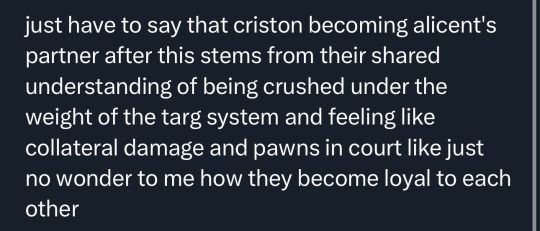
‘crushed under the weight of the targ system’ do y’all ever just SHUT UP MY GOD
#hotd#fandom wank#this just in folks#the targaryens invented feudalism#who would’ve fucking thunk it#that cesspool of an app breeds morons i stg#we’re all one step closer to hell#anti criston cole#anti alicent hightower
153 notes
·
View notes
Text
i know this episode is dumb filler but:


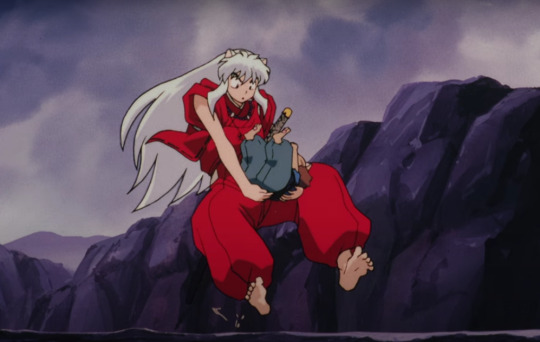
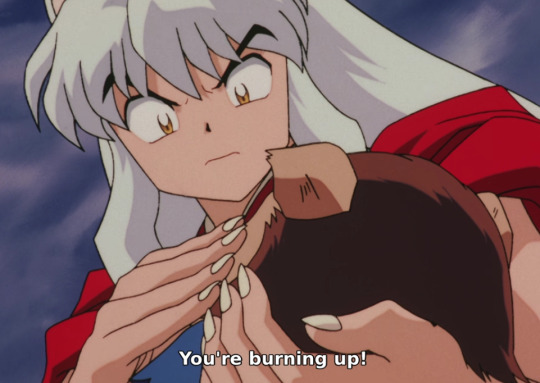
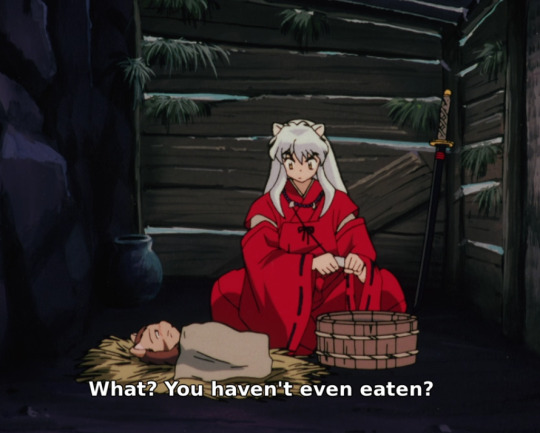

and what pisses me off is that we could've had THIS with him and moroha. we could've had him helping her train, taking care of her when she's ill, and just...being the father figure he wished he could've had in his life. there's this repeating theme of him seeing himself in other youkai children and taking care of them, or at least emphasizing with them. he relates. he gets it. he doesn't want them suffering the way he did. and yashahime was like "hm...what if...amazing idea incoming...he didn't get to raise his daughter? lol."
#why. why do this.#oh right money#lovely incentive to destroy the established themes and characters from the og series#the more i think about this the more angry i get#moroha deserved to be raised by her parents and they deserved to raise her and they deserved to all be happy#what is this bullshit sunrise#anti yashahime#yashahime#inuyasha#inuyasha anime#moroha#yashahime princess half demon#moroha yashahime#inuyasha a feudal fairy tale
387 notes
·
View notes
Text
I really don’t understand the people here who don’t like the smallfolk/are mad about the Storming of the Dragonpit. In Asoiaf dragons are not mystical creatures with dog like personalities, they’re flying nukes.
Like besties….its giving bootlicker. It’s giving defending nepo babies and feudalism. It’s giving so you WANT to be oppressed?
You are not from House Targaryen or even House Crane. You are a bread baker from the Stormlands. You are sheep farmer that Aegon is using to feed Sunfyre. You are at MOST a ship pedaler or doing Helaena’s laundry. If you’re from the Riverlands good luck because there’s a 90% chance a random lord is going to terrorize your house for fun. Daemon Targaryen would land Caraxes on your father and scoff if you told him that was your dad.
I’m asian so I realistically I’m probably a rice farmer in Yi Ti.
Sansa irl would be your really nice delusional friend who romanticizes about living in an apartment while her parents pay her rent and wonders why you have a job while in school.
It’s literally Jon’s first arc when he gets to the wall. Yeah he’s a bastard and got emotionally neglected but like…he grew up in a castle and was trained by Winterfell’s master at arms like sir your life really was NOT that hard. Same with Arya and her whole journey in the Riverlands and how being a servant is not rlly that different than being a slave. And Jaime during FoC aka the AFTERMATH and consequences of war and how it utterly fucks up the smallfolk. Love the main cast but I’m not delusional enough to not see: that if you’re not a nepo baby you are utterly FUCKED in Asoiaf.
Maoism would go crazy in Westeros. Karl Marx would be the equivalent to Jesus to Gendry. The French Revolution is a fairytale spread by Mysaria that starts the Storming of the Pit. Malcolm X would be a prophet in Essos and is Dany’s final boss fight against Valyria’s history of enslavement and colonization.
Anyways ✨Stan Smallfolk✨ and eat the rich
#asoiaf#stan smallfolk#could never make me hate them#how are you gonna be mad at poor people defending themselves against the rich#feudalism#hotd#eat the rich#storming of the dragonpit#asoiaf meta#anti targaryen#but on the down low more anti feudalism
55 notes
·
View notes
Text
I am BEGGING the writers of HotD and its fans to understand that Westeros is a FEUDAL monarchy. Not an absolute monarchy. If we wanted to see absolute monarchy where the Kings word is law and must be obeyed, YiTi is right there.
In a feudal society, the king must be obeyed but his word is NOT law. The power is shared between a king and his nobles and therefore Laws and Customs must be obeyed even and especially by the royal household. The social contract between a feudal king and their vassals are the corner stone of feudal society and if the king breaks said social contract, the nobles are well within their rights to rebel. Everything that happened in the main series was due to the monarch breaking their social contract to their lords left and right.
Viserys, in said society. Cannot choose his own heir if it went against convention. If he had that power as a feudal king why didn’t Jaehaerys use his power as king to nominate him as heir after Baelon died? He had to have called a great council because lords and kings did not have the power to choose. If Viserys wanted Rhaenyra to be queen after him he should’ve codified the succession laws, but if he did it his entire line would’ve been usurpers dating back to Jaehaerys.
Let it be said that Valaryin succession laws are more misogynistic than Andal ones, as we’ve seen time and time again that a uncle inherits before the daughter (Jaehaerys with Aerea, Baelon with Rhaenys and finally Viserys before both Laena and Laenor). The rest of Andal and First Men houses follows the Andal succession laws where sons inherit before daughters and daughters before uncles and cousins.
Rhae Royce was a lady in her own right because she was her father's only child. Jeyne Arryn too. But based on all existing precedent regarding who should inherit the Iron Throne, Rhaenyra had no right to it. Not without discrediting her entire line as they became king through means that were arguably usurpation in all meaning of the word dating to Jaehaerys era.
In an absolute monarchy she would’ve stood a chance even without oaths and alliances but that would’ve been challenge too as soon as her sons gave the more misogynistic nobles a reason to doubt her worthiness. But this story is set in a feudal society where conventions hold weight and breaking social contracts means heavy repercussions to whomever broke it first. And before someone brings up the whole “Laenors gay! Do you want her to assault him!!!”thing we can literally look at GoT Margery and her proposed solution to Renly being completely uninterested in the female sex. She had her chance and squandered it by having a bastard in next to no time after her wedding.
#anti hotd#anti team black#anti viserys targaryen#anti rhaenyra#feudal kings aren’t allowed to do whatever they want just because they’re kings!!!!#this isn’t an absolute monarchy!!!!
61 notes
·
View notes
Note
Sorry if that's already been asked but what do you think about the "King's word is the law" in hotd/dance discourse? I'm not sure where that even came from and for me there is 0 evidence that suggests it's true
Hi anon, excellent question! Sorry it took me so long to reply, this got a bit long! This is actually something that comes up a lot when I teach feudalism to my high school students. I've found that most people in general do not know the difference between feudalism and absolutism, and conceive of all kingship as a form of tyranny. And compared to most modern systems of government, of course feudalism and absolutism are both oppressive and restrictive, so the difference can feel a bit like splitting hairs. Neither system gives the the common people any real voice, but the difference is that feudalism is a system with a relatively weak monarchy that has to, both directly and indirectly, answer to both the church and to his vassals. But Westeros, even under the Targaryens, even with the dragons, is not, strictly peaking, an absolute monarchy but rather a feudal monarchy.
Broadly speaking, in a feudal system "the king's word is law" is only true insofar as the king can enforce that law, and to enforce his laws he needs the support of his vassals, the landholders who supply him with his armies and revenues. The feudal relationship between the king and his vassals looks roughly like this (this is the actual diagram we use in my world history curriculum):
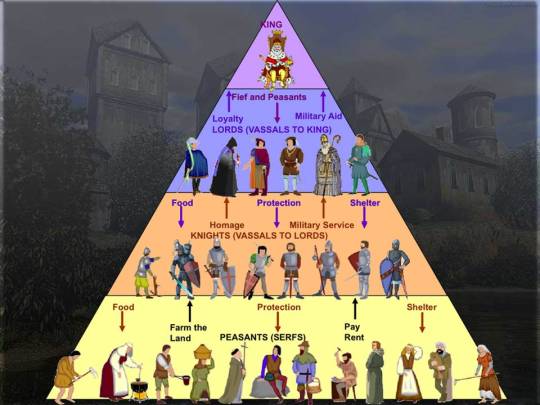
Notice how the relationships are all reciprocal? The king might technically own all the land in the realm, but he has no standing army of his own. Knights pledge their service to the lords, rather than the king (he will have some knights in his personal service too, but not nearly enough to make war). It is in the king's best interest to keep his vassals happy. He needs them! They help him keep other unruly vassals in check, help defend against foreign invasion, and help him wage his own wars of expansion. They also provide the crown with revenue in the form of taxes, and their farmlands are what provide food for the people of the realm. In Westeros in particular, the royal family does not hold much land of its own (the land held by the royal family is called the royal demesne and the Targaryen royal demesne is very small compared to that of irl kings), so it's particularly dependent on the support of the vassalage. This makes it a relatively weak feudal monarchy, all things considered.
(also, notice the bishop up there with the lords? Usually, he would usually be appointed by the king with the approval of the pope, but the question of whether or not church officials were subjects of the king and subject to the king's laws was a huge point of contention hat caused many power struggles in medieval monarchies, and there was a whole separate court system, the ecclesiastical court, to deal with the crimes of court officials)
Anyway, a feudal king who just does whatever he wants without regard for his vassals will quickly find himself being named a tyrant, and the accusation of tyranny is a serious one in a feudal system, because vassals will rebel rather than serve a tyrant. Rebellions were not usually done with the goal of overthrowing the king completely, they were done in order to pressure the king into listening to their demands. We saw this happen with King John, whose barons were unhappy for a number of reasons including what they saw as avaricious economic policies, costly wars with France, increased royal interference in local administration of justice, and conflicts between the king and the church. Eventually, John's barons pressured him into signing the Magna Carta, a document that specifically limited the power of the king and stated outright that the king was not above the law and that the king could not impose new laws without the consent of the lords. John later repudiated this document, which led to further rebellions, and his son and heir Henry III had to reaffirm it after his death (and a series of rebellions still plagued Henry III). Eventually, this leads to a formalization of the idea that the king must not act without the consent of his lords and the creation of parliament.
Now, we never see a Westerosi Magna Carta or the creation of a set parliament, there is the small council and the occasional great council, and lords can and do object to the king's laws, force concessions, and remove kings. Notably, Robert's rebellion in the main series is an example of vassals losing faith in their king and eventually removing him. Aegon V cannot push his reforms through because he lacks the support of the lords, and in his desperation tries to bring back the dragons. But if we look back, even dragonriding Targaryens could not simply impose their will without the cooperation of the realm's lords. Aenys was considered weak and his rule was beset by rebellions, eventually coming to a head when he arranged an incestuous marriage for his heir, this after the Faith was already displeased with his brother's polygamous marriage. This led to Aenys being known as known as King Abomination and the Faith Militant uprising forced him to flee to Dragonstone. Maegor, who followed him, is ousted (and killed) as a tyrant for going further than that, suppressing the faith and committing kinslaying against his nephew. What makes Jaehaerys' rule notable and successful is that he's very good at appeasing the lords and when he is going to do something controversial, like the Doctrine of Exceptionalism or changing the succession, he campaigns and politicks for their support (I maintain that he knew Viserys being picked at the council was a forgone conclusion, but he did not want to unilaterally go against Andal custom without consulting his lords, it's a CYA move). This is something Viserys completely fails to do, not only failing to drum up support for his unconventional choice of heir, but actively alienating potential supporters.
It's worth keeping in mind that "law" means something different in this context than what many of us are used to today. Medieval law, and Westerosi law, was a hodgepodge of custom, statute, and precedent. Westeros, like England, operates on "common law." Successions are disputed all the time because competing claims exist. If Viserys named Mushroom heir, is his word law? What if he names Helaena? Jace? And in a normal situation, if it wasn't the succession of the throne in question the rival claimants would present their petitions, citing evidence and precedent, and the master of law, magistrate, or the king would make a ruling. The will of the lords is especially required to enforce an unconventional royal succession because succession takes place after the king is dead, and so if the succession is disputed, the claimants and the lords of the realm have to settle the dispute, nonviolently if possible, or else civil war will follow.
And you can get the lords behind an unconventional succession, but you have to have a good reason. "She's my favorite child from my favorite wife" is not actually good enough. For instance, when Robb chooses to legitimize Jon and disinherit Sansa in order to keep Winterfell out of Lannister hands, this is widely accepted among his vassals and allies because the reasoning is sound. Jon may be a bastard, but it would be worse for everyone to have Winterfell pass to a Lannister, even if it's shitty for Sansa. By the same logic, initially, Rhaenyra is accepted as heir because the lords do not want Daemon on the throne (the man she is now married to!). But after Aegon is born most assumed he would naturally become his father's heir. And remember, there's no reason for Alicent to marry Viserys if he cannot even ensure he inheritance of his own firstborn son. And Viserys never builds a case for Rhaenyra while he is alive, never tries to present Aegon as unworthy, he never has the lords come reaffirm their oaths, never writes a decree to formalize Westerosi succession. He doesn't take action because he knows he would not achieve anything near consensus (despite certain houses choosing Rhaenyra when it comes to war, it's doubtful they would have made the same choice if it had been a great council), so instead of dealing with the problem, he passes it on to his children.
I think it's fair to view the challenge to Rhaenyra's succession as an objection to what some see as tyranny on the part of the king. Viserys and Rhaenyra set themselves above the law in multiple ways-- not just jumping ahead of a son in the line of succession, but the way she has destabilized her own rule by placing bastards in her line of succession. What they are doing defies all precedent, and in a world where law is built in large part from precedent, this is not something the lords of the realm are obligated to accept.
112 notes
·
View notes
Text
How the new Assassins Creed conversation is going for some reason (sadly very true)
#assassins creed shadows#assassins creed game#historical events#ubisoft#yasuke#african samurai#feudal japan#controversy#fan reactions#naoe#fujibayashi nagato#historical figures#samurai#shinobi#video game release#november 15#game trailer#netflix anime#video game franchise#racism#anti-blackness#systemic racism#racial discrimination#racial injustice#racial bias#structural racism#racial inequality#racial issues#racial prejudice
94 notes
·
View notes
Text
Is it verging on tinfoil hat territory to laugh about how the egg Aegon II failed to hatch after murdering Rhaenyra was purple?
Or could it be an... easter egg?
#I'm so sorry you guys I'll see myself out#asoiaf#team black#rhaenyra targaryen#anti aegon ii targaryen#Amethyst Empress#Bloodstone Emperor#but seriously are we still pretending that the Amethyst Empress is some kind of puzzle and not an allegory for forsaking your women?#and that “lightbringer” is a literal sword and not Dany reviving magic when she hatched her dragons and came into HER OWN power?#Righting the wrong House Targaryen did by sacrificing generations of women to assimilate into a patriarchal feudal-monarchical system?#and by extension severing their connection to their culture and heritage that their magic came from?#and that it's telling that the Targs were the only ones to survive the doom with their dragons because they LISTENED to Daenys#And withdrew from a doomed realm to make their own place only to then assimilate into another doomed realm?
79 notes
·
View notes
Text
When I see a TB say that westeros isn't a Feudal society I always go back and look at this line in Fire and Blood and laugh as it legit says it is.

#house of the dragon#hotd#team green#pro team green#anti team black#westeros#feudalism#anti tb stans#anti team black stans
64 notes
·
View notes